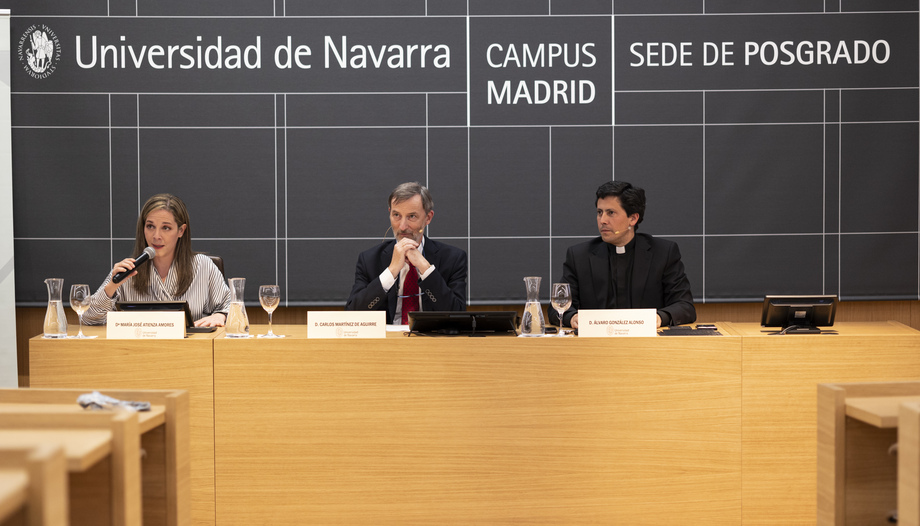The postgraduate headquarters of the University of Navarra in Madrid hosted the Omnes Forum "Marriage in the West: from deconstruction to reconstruction", which featured presentations by Álvaro González Alonso, academic director of the Master's Degree of Continuing Education in Marriage Law and Canonical Procedure at the University of Navarra, and Carlos Martínez de Aguirre, Professor of Civil Law at the University of Zaragoza. María José Atienza, editor-in-chief of Omnes, introduced the speakers and moderated the panel.
The first to speak was Carlos Martínez de Aguirre, who highlighted "the mutations in Civil Law, which have not only changed the rules of the game, but the game itself". To such an extent that we have witnessed the subjectivization of the concept of marriage and of the family.
Among these changes are "technical and medical advances that have brought about changes in society, such as the possibility of procreating without the need to have sex". These are joined by sex change surgeries or new legal measures to register with a different sex.
"This whole set of things," Martínez de Aguirre pointed out, "conveys the message of the dominance of human will over the sexThe "family realities, procreation and family realities".
A new concept of family
This, which is already complicated at the anthropological level, makes "from the technical legal point of view the situation more and more complicated", because "there is a double disconnection within family law". There is no longer a biological basis and this allows the legislator to modify the basic concepts at will.
Currently, there is an "adult-centered concept of the family, centered on the desires of adults and overlooking the interests of minors. From this derives, the professor considered, another consequence: "marriage is increasingly treated as a self-satisfying intimate relationship between adults". The result of this is that "children are left at the expense of the desires and interests of adults".
Traditionally, "marriage was an institution linked to procreation. These features disappear when homosexual marriage and divorce are accepted at the civil level". This is relevant because "the consistent decision to admit that two people of the same sex can marry affects the very structure of the family". On the other hand, "facilitating divorce changes the way of considering marriage and also has its technical consequences".
The end of obligations
When we let divorce into the equation, said Martínez de Aguirre, "the obligations of the spouses change. Either one of them can terminate them whenever they want."
"The existence of such an accessible divorce discourages the patrimonial and personal investment in a marriage", consequently, premarital pacts, which often seek to safeguard one's assets in view of the divorce, are becoming more and more frequent.
The change in concept is evident. "It used to be said that marriage is much more than a contract, but now we have reached the point of saying that marriage is much less than a contract."
However, the professor pointed out that "the deconstruction is not total. There is still the trait of the couple, of unity". Although it is true that, "considering the canonical marriage and the civil marriage, we are facing two different figures that the only thing they share is the name".
Paternity and filiation
Now that "we have radically separated the biological data from the legal data", we realize that "filiation is beginning to break down as well". This is not just an idea, but, as Martínez de Aguirre pointed out, "we have lost quality of family life in practically all the indicators we could consider".
Therefore, "an in-depth rethinking of the legal regulations of marriage is necessary".
Preserving the vision of marriage
To summarize his intervention, the professor of the University of Zaragoza affirmed that "civil law does not have an idea of what marriage is". But "canon law helps to preserve the vision of marriage that will allow us to recognize that the path that is being taken right now is leading us nowhere".
After Carlos Mártínez de Aguirre's presentation, the floor was opened to questions. One of the issues discussed was the protection of marriage against legal abuses. Professor Aguirre stressed the importance of rediscovering the importance and essence of marriage. He also questioned the accompaniment of young people who are thinking of getting married, to which the speakers responded that it was important not to look for existential answers in the legal field and to give importance to the preparation of those accompanying the bride and groom.
After the questions, Álvaro González Alonso took the floor to explain the Master of Permanent Formation in Matrimonial Law and Canonical Procedure of the University of Navarra. This postgraduate course is approved by the Holy See, lasts one academic year and is taken online in an 80%. It has five fundamental characteristics:
- Scientific rigor and interdisciplinarity
- Support and flexibility
- Quality of the academic staff
- Service to the Church and society
- Internationality
The importance of training
González Alonso stressed the importance of deepening the knowledge of a subject such as the Master's because "it matters what the institution of marriage is in itself," and the formation of the curriculum facilitates this greater knowledge. On the other hand, he pointed out that "the deeper the knowledge, the easier it will be to accompany".
In conclusion, the academic director expressed the need to bring canon law and civil law closer together, saying that "a development of legislation in accordance with the truth of marriage and the family is urgently needed".







